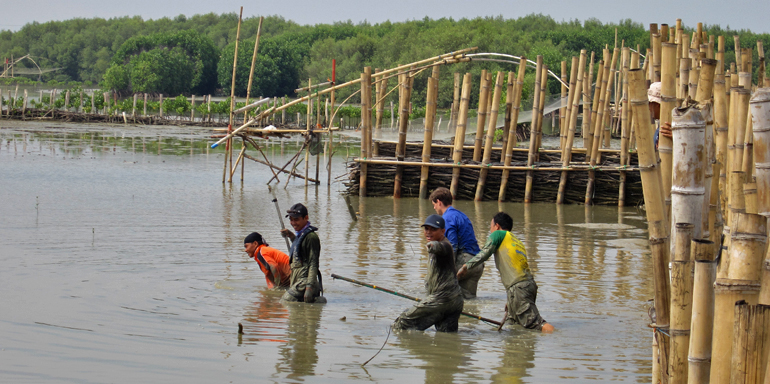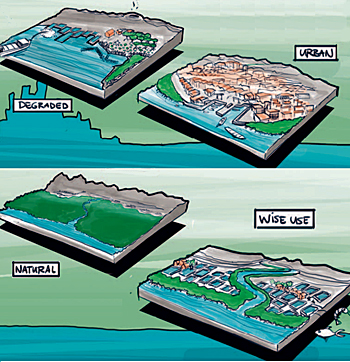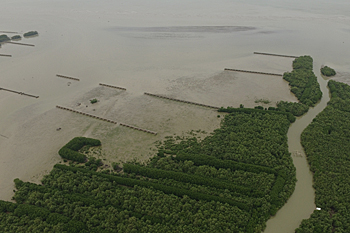German government helps to scale up nature-based coastal restoration in Indonesia
 Wetlands International announced that International Climate Initiative (IKI) of the German Environment Ministry (BMUB) has granted financial support to scale up a running pilot which aims to restore the eroded coast in the district of Demak, Central Java, Indonesia.
Wetlands International announced that International Climate Initiative (IKI) of the German Environment Ministry (BMUB) has granted financial support to scale up a running pilot which aims to restore the eroded coast in the district of Demak, Central Java, Indonesia.
The German IKI initiative promotes healthy wetlands around the world as part of its ecosystem-based adaptation to climate change portfolio.
This grant supports replication of the Building with Nature concept that is currently used by Wetlands International in the coastal restoration pilot in Demak.
 The concept of Building with Nature is based on the wisely use of natural coastal processes (illustration:JAM Visueel Denken).
The concept of Building with Nature is based on the wisely use of natural coastal processes (illustration:JAM Visueel Denken).
Building with nature concept
The concept of Building with Nature is an innovative approach to coastal and water management challenges. It makes the services that nature provides an integral part of the design of hydraulic infrastructure.
This type of coastal restoration is an alternative to traditional hard infrastructure concepts which have proven ineffective along unstable muddy coastlines and fail to provide the multiple benefits that nature can provide.
Sediment trapping
The coastal restoration pilot in Demak involves construction of permeable sediment trapping structures to rehabilitate the mangrove belts, and the much-needed transformation of the aquaculture sector towards sustainable shrimp production, to ensure local income and prevent the future renewed loss of mangroves.
Mobilising replication
The IKI initiative supports this Building with Nature concept to scale up in Indonesia by mobilising knowledge institutes to provide trainings on a broad range of measures applicable.
This will also include the setup of a help desk facility that provides on-the-job guidance on all aspects of the project life cycle.
New aspects under the IKI funded programme include integrated water management planning and demonstration activities that offer an alternative to the deep ground water extraction which is currently causing land subsidence.
For example, restoration of rivers enables freshwater use for aquaculture and simultaneously allows distribution of sediment on land to mitigate subsidence.
 Aerial view of the sediment traps along the coast of Demak and the mangrove forest that can gradually take over the role of the dams and attenuate the waves and keep the sediment in place.
Aerial view of the sediment traps along the coast of Demak and the mangrove forest that can gradually take over the role of the dams and attenuate the waves and keep the sediment in place.
Partnership and donors
The Demak-project is coordinated by Wetlands International on behalf of the Ecoshape consortium and includes partnership with the Ministry of Marine Affairs and Fisheries (MMAF), Ministry of Public Work and Human Settlement (PU), the Diponegoro University, Dutch research institute Deltares, Wageningen University, water education centre Unesco-IHE, Dutch consultancy firm Witteveen+Bos, German engineering firm Von Lieberman, and local communities.
The project is financial supported by the Dutch Sustainable Water Fund, the German Federal Ministry for the Environment (BMUB) as part of the International Climate Initiative (IKI), Waterloo Foundation, Otter Foundation, Topconsortia for Knowledge and innovation, and mangroves for the future.
This news item was originally published on the website of Wetlands International.
Read also on this website
• Wetlands International reports first sediment build-up behind permeable coastal dam on Java, Indonesia, 3 March 2016
• Indonesia and Netherlands launch initiative for coastal safety Java, 3 March 2015
• Country: Indonesia
More information
Wetlands International
Wageningen, the Netherlands
+31 318 660910
www.wetlands.org
Ecoshape, Building with nature
Dordrecht, the Netherlands
+31 78 6111 099
www.ecoshape.nl



